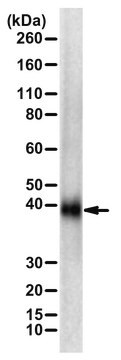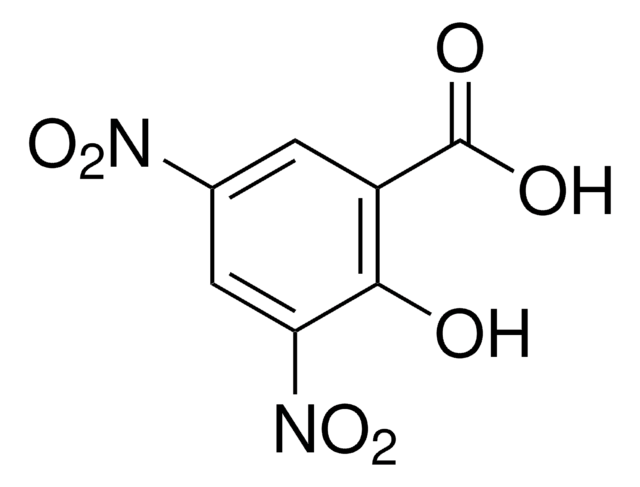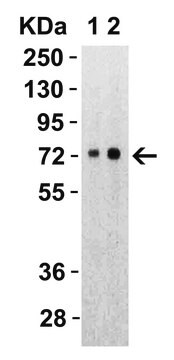MABF2815
Anti-SARS-CoV-2 Spike RBD Antibody, clone 6C2-G9
About This Item
Empfohlene Produkte
Biologische Quelle
mouse
Qualitätsniveau
Konjugat
unconjugated
Antikörperform
purified antibody
Antikörper-Produkttyp
primary antibodies
Klon
6C2-G9, monoclonal
Mol-Gew.
calculated mol wt 141.18 kDa
observed mol wt ~200 kDa
Speziesreaktivität
virus
Verpackung
antibody small pack of 100 μg
Methode(n)
ELISA: suitable
immunoprecipitation (IP): suitable
neutralization: suitable
western blot: suitable
Isotyp
IgG1
UniProt-Hinterlegungsnummer
Versandbedingung
dry ice
Lagertemp.
-10 to -25°C
Posttranslationale Modifikation Target
unmodified
Allgemeine Beschreibung
Spezifität
Immunogen
Anwendung
Evaluated by Western Blotting in lysate from HEK293T cells expressing full-length spike protein of SARS-CoV-2 virus.
Western Blotting Analysis (WB): A 1:1,000 dilution of this antibody detected Spike glycoprotein in HEK293T cells expressing full-length spike protein of SARS-CoV-2, but not in lysate from wild-type HEK293T cells.
Tested Applications
Neutralizing: A representative lot neutralized SARS-CoV-2 Spike protein RBD to ACE2 in Neutralizing applications (Courtesy of Kento Abe and Anne-Claude Gingras, Toronto).
ELISA Analysis: A 1:3 dilution from a representative lot detected SARS-CoV-2 Spike protein. (Courtesy of Stefan Schüchner, Ingrid Mudrak, Ingrid Frohner, and Egon Ogris (Max Perutz Labs, Medical University of Vienna, Austria).
Western Blotting Analysis: A 1:400 dilution from a representative lot detected Sars-CoV-2 Spike protein in Whole cell lysates of HEK293T cells expressing full-length spike protein of SARS-CoV-2. (Courtesy of Stefan Schüchner, Ingrid Mudrak, Ingrid Frohner, and Egon Ogris (Max Perutz Labs, Medical University of Vienna, Austria).
Neutralizing: A representative lot neutralized SARS-CoV-2 Spike protein RBD binding to ACE2 receptor. (Abe, K.T., et al. (2020). JCI Insight 5(19):e142362).
Immunoprecipitation Analysis: A representative lot immunoprecipitated SARS-CoV-2 Spike protein. (Courtesy of Stefan Schüchner, Ingrid Mudrak, Ingrid Frohner, and Egon Ogris (Max Perutz Labs, Medical University of Vienna, Austria).
Note: Actual optimal working dilutions must be determined by end user as specimens, and experimental conditions may vary with the end user
Physikalische Form
Lagerung und Haltbarkeit
Sonstige Hinweise
Haftungsausschluss
Sie haben nicht das passende Produkt gefunden?
Probieren Sie unser Produkt-Auswahlhilfe. aus.
Lagerklassenschlüssel
12 - Non Combustible Liquids
WGK
WGK 2
Flammpunkt (°F)
Not applicable
Flammpunkt (°C)
Not applicable
Analysenzertifikate (COA)
Suchen Sie nach Analysenzertifikate (COA), indem Sie die Lot-/Chargennummer des Produkts eingeben. Lot- und Chargennummern sind auf dem Produktetikett hinter den Wörtern ‘Lot’ oder ‘Batch’ (Lot oder Charge) zu finden.
Besitzen Sie dieses Produkt bereits?
In der Dokumentenbibliothek finden Sie die Dokumentation zu den Produkten, die Sie kürzlich erworben haben.
Unser Team von Wissenschaftlern verfügt über Erfahrung in allen Forschungsbereichen einschließlich Life Science, Materialwissenschaften, chemischer Synthese, Chromatographie, Analytik und vielen mehr..
Setzen Sie sich mit dem technischen Dienst in Verbindung.





